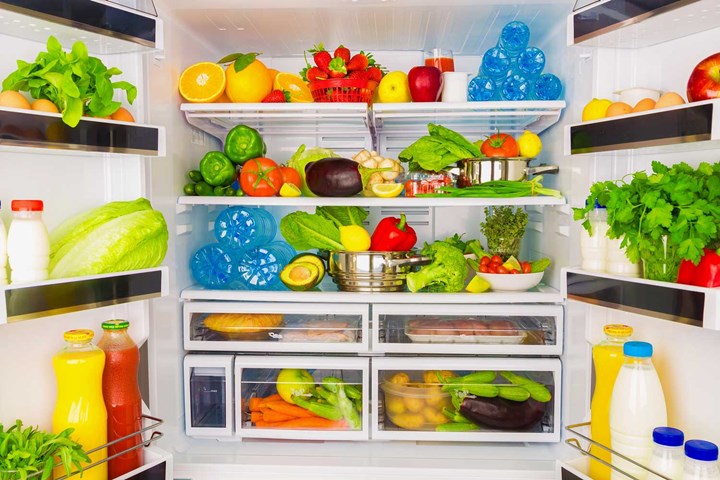
If you want to stop throwing out food and reduce your shopping trips, this guide by Freedom Foods Nutritional Adviser for Dr Joanna McMillan is an absolute necessity. McMillan tells us both how to store foods for maximum lasting time and when it’s time to say goodbye.
Best-before vs use-by dates
Much confusion has been caused by these two systems for labelling our food. The use-by date is all about safety and foods may not be safe to eat after this date.
The best-before date is simply a guide as to when the quality of the food may – and that is the operative word – start to diminish. It does not mean the food is no longer safe to eat. In fact, it is still legal for shops to sell food after it’s best-before date.
Unfortunately, many people confuse the two and immediately bin food that is on and after its best-before date. It’s an incredible waste of money, a travesty for those going hungry and a disaster for the health of our planet.
Lesson one therefore is to pay little heed to the best-before date!
How can we tell if food is still safe to eat?
Do of course pay heed to the use-by date, particularly for foods with a higher risk of making us sick if it has gone off. Raw meat and seafood are stand out examples. But remember that it also matters how all foods are stored, including these.
So here’s how to store these common foods and here’s when it’s time to chuck them in the bin.
Bread
Keep your bread in a bread box at room temperature (not in the fridge).
Fresh bread is best used within 2-3 days, but it does depend on the variety. Some such as fresh sourdough or a French baguette is best consumed with 1-2 days, while supermarket packaged breads may keep for up to a week.
Bread also freezes really well and you can defrost at room temperature or pop straight into the toaster when you want to use.
RELATED: Bring On The Bread Basket! Science Says It’s Good For Your Heart
Bread that is a couple or more days old, but still free of any mould, is perfect to make breadcrumbs. Simply blitz in a food processor or blender and store in a sealed bag in the freezer. I do this with all my old bread and it means I have wholegrain breadcrumbs readily to hand for making healthier homemade schnitzel or fish fingers for the family.
Try not to get to this point but if you see spots of mould, it’s time to chuck.
Eggs
Eggs will keep for several weeks if stored correctly. Keep them in the fridge in the cardboard carton you bought them in. Egg shells are porous and can absorb smells and flavours of foods around them if not kept in their container.
Eggs are best cooked for most things, especially baking, from room temperature. If you don’t use many eggs then simply take your eggs out for a recipe half an hour or so before you need to use them.
Fresh eggs are best for poaching and frying, but older eggs can be used up happily in baking and cooked egg dishes such as frittata or a quiche.
If the egg shell is cracked or damaged in any way there is greater potential for bacteria to have thrived and the egg may no longer be safe to eat.
If you’re not sure about the safety of an egg, crack it open into a bowl first and look for any signs of discolouration and have a sniff. While the sniff test is not always reliable for all foods, it’s a pretty good one with eggs!
Milk
You don’t need me to tell you to store fresh milk in the fridge, that’s a given. But how often do you take the milk out and leave it on the table or bench while everyone has breakfast or while using in cooking? Be aware that the longer the milk is left out and the more often this happens, the quicker it will go off.
Milk can be frozen, so if you buy too much utilise the freezer.
Throw out milk that does not smell fresh, has lumps or has taken on a yellowy colour. It’s usually pretty obviously when milk has gone off.
Cheese
Hard cheese will keep far longer than soft cheese like brie, ricotta or cottage cheese. If there is mould on the outside, simply cut it off and a little of the surrounding cheese and the inside is still safe to eat. If soft cheeses are mouldy and stating to smell, chuck them but try not to get to that point!
Potatoes & sweet potatoes
Do not store these in the fridge. Potatoes and sweet potatoes will store for several weeks in a dark pantry provided they are taken out of plastic and placed in a basket or paper bag.
If they have started to sprout a little, simply cut that part off along with any green parts. The rest is safe to eat.
Don’t wash the produce until you are ready to cook. If already washed when you purchase, make sure the potatoes are completely dry before storing.
Only chuck if withered and going soft. Try to catch them long before this and use up in soups or casseroles – you can always freeze these for a later date.
Fruit
Fruit will not ripen in the fridge, so any unripe fruit must be left on the kitchen counter to ripen. This includes avocado.
Tropical fruits in general like to be at room temperature and will lose flavour in the fridge. Store your pineapple. Mango, melon, pomegranates and papaya in the fruit bowl. But once cut you’ll need to keep in the fridge.
Berries are best kept in the fridge unless you are going to eat them straight away. The flavour is often much better at room temperature, but they will rot more quickly if left out. Don’t wash them until ready to use or they will go off more quickly.
RELATED: Are Frozen Fruits and Vegetables As Good As The Fresh Option
Apples, pears, oranges and stone fruits are all best kept in the fridge once ripe, but keep them separate to your vegies.
Keep your bananas in the fruit bowl but once they start to speckle brown they need to either be eaten straight away or you can peel them and freeze in a sealed bag. I always have a stash of frozen bananas ready to make healthy frozen desserts for the kids, to pop into smoothies or to use in baking.
It’s pretty obvious when you need to chuck off fruit – you really don’t need a use-by or best-before date! Trust yourself and don’t throw out perfectly good produce. If you think it is slightly past it’s best use in cooking.
Vegies
Don’t wash vegies until you are ready to use. As with most produce the moment water is introduced the potential for bugs to grow is increased.
Wrap herbs in a damp paper towel and then in a sealed bag and store in the crisper section of your fridge.
Onions and garlic are best kept in the pantry and separate to your potatoes. Be sure to remove any plastic they came in so they don’t sweat and can breathe.
Store other vegies in the crisper section of your fridge. Many vegies once starting to wilt can be revived by placing in a bowl of cold icy water.
Store cut carrots, celery and capsicum in water in the fridge and they will keep all week.
Vegies that are past their best can be blitzed up into a vegie soup or added to a casserole.
Only chuck them when they are obviously no longer good. As with fruit you really don’t need a stamped date to tell you when that is.
Meat & seafood
It’s obvious but keep them in the fridge unless canned. Use-by dates will tell you when they must be used by.
Ensure they are separate to other foods in the fridge, especially those you consume raw or are ready to eat. Wrap them well to ensure there is no leakage of raw juices that can contaminate other items in the fridge.
Meat that is slightly dark is not off. This is normal for meat and it is only that packaged meat is flushed with gases to keep it red and stop it from oxidising that has led us to think fresh meat should be bright red.
Meat that smells off almost certainly is.
RELATED: The Muscle-Building Staple You Need To Cut Back On To Live A Longer Life
Similarly, seafood should not have a strong fishy smell. Fresh seafood smells fresh and is not slimy.
If consuming raw or rare, you need to buy produce that is very fresh and intended to be consumed in this way.
Minced and cut meat must be used more quickly than a large or whole piece of meat or fish. That’s because bacteria on the surface of the meat has now been spread throughout. Cook this up more quickly.
If you have meat approaching its use-by date either pop it in the freezer or cook it up immediately into a dish to give you extra time to consume.
By Nutritional Adviser for Freedom Foods Dr Joanna McMillan.














